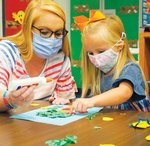



Editor’s note: In this third of a series of reports, the News + Record examines early childhood education in Chatham, looking specifically at the importance of equitable prekindergarten programs for student success. Future installments in the series will provide a deeper dive into various areas of school equity.
Jaime Detzi first became a staunch prekindergarten advocate three years ago.
As the executive director for Chatham Education Foundation (CEF), she’d be talking with a CEF board member about Chatham County Schools’ first Kindergarten readiness camp, which her organization was funding.
“We just started thinking, ‘OK, that was a three-week, half-day camp, and it did make an impact,’” Detzi said. “If you looked at students, just even being in school and learning how to do school for three weeks, for kids who had never been in a preschool before, it was huge. And we started thinking that’s kind of like a Band-Aid fix to the bigger problem — and that’s getting kids into quality Pre-K programs.”
CEF originally looked into Pre-K as a part of its campaign for grade-level reading in Chatham, which is all about 3rd grade reading proficiency. One of the main indicators of 3rd grade reading proficiency is “Kindergarten readiness,” some studies show, though the term itself is frequently debated in education forums. Some people disagree on which skills should be expected from Kindergartners; others worry the concept puts more responsibility on an individual child to learn, rather than on the school entrusted to teach them.
Still, in Chatham, Pre-K advocates, experts and teachers agree: a quality early childhood education is important to student success and should therefore be as accessible as possible.
“If we’re going to increase our 3rd grade proficiency, what do we need to do on the front end to help make that happen?” Detzi said. “And quality, 4-year-old preschool (education) is just one aspect of that.”
Some studies also show Pre-K attendance increases graduation rates and lifetime earnings, and can decrease incarceration rates. Pre-K helps with language acquisition, particularly for children from households that do not speak English or where parents or guardians can’t read regularly with them. Additionally, preschool helps students develop social and emotional skills which can ease the sometimes difficult transition to kindergarten.
“There’s all sorts of reasons why you should do Pre-K,” Detzi said.
There are multiple Pre-K options in Chatham, spanning from private preschool programs to government-supported public programs, like N.C. Pre-K and federally supported Head Start. (N.C. Pre-K also supports private child care operators.)
At Chatham County Schools, the Pre-K program has 11 preschool classrooms across seven elementary schools and three Pre-K Exceptional Children classes. The program runs from September to June from 8 a.m. to 2:30 p.m.
Private pay fees for CCS Pre-K include a $300 application/acceptance fee in addition to a $615 monthly cost. (At 10 months of tuition, that’s a $6,450 annual cost.)
The program also accepts subsidy vouchers, and has NC Pre-K and Title I slots, which funds tuition for “at risk preschoolers” and students with the greatest academic needs. Chatham Grove is currently the only school which only accepts private funding; it’s a new school and in the process of applying for funding.
According to a report by the Carolina Demography, 26,780 children — approximately 48% of North Carolina’s 4-year-olds from lower-income families — were enrolled in the N.C. Pre-K program during the 2018-19 school year. Fifty-two percent were not.
This year, CCS Pre-K has 199 students, Pre-K Instructional Program Facilitator Cindy King told the News + Record, down from its typical 220-250 range. By the time of publication, the News + Record had not received a report or numbers regarding the demographics of children at each CCS preschool.
According to CCS’s Month 1 enrollment report, there are 636 kindergarten students this year. On a normal year, CCS Pre-K serves about 220-250 students; the Partnership for Children serves around 280. Even with other programs such as Chatham County Head Start, and additional private programs, that still likely leaves a gap of students.
Genevieve Megginson, executive director of Chatham County Partnership for Children, said North Carolina is a “national leader in addressing the need for quality early education.” Megginson specifically cited N.C. Pre-K, a state-funded program “designed to provide high-quality educational experiences to enhance school readiness for eligible 4-year-old children,” according to the program’s website.
N.C. Pre-K was launched in 2001, in part due to research which showed disadvantaged students entering Kindergarten “behind,” and in part due to pressures from the 1997 Leandro v. State case, which upheld the state constitution’s right to a sound basic education.
Universal Pre-K has garnered more attention this year, namely due to President Joe Biden’s proposal for universal preschool in his April American Families Plan. In that plan, he also proposed ensuring that no household spends more than 7% of its income on childcare.
Last week, Gov. Roy Cooper announced the start of state Child Care Stabilization Grants, with money originating from the American Rescue Plan Act. The money — $805 million — is meant to help with recruitment and retention within early childhood centers following prolonged pandemic challenges, and generally low pay for Pre-K teachers and employees.
Licensed child care programs eligible for the grants include nonprofit community-based and private child care programs, family child care homes and faith-based programs.
“Now there’s this national conversation about universal Pre-K,” Megginson said. “But I actually think that the first three years needs much more attention, and in North Carolina, that’s where we are because we’ve already developed the 4-year-old program.”
While North Carolina’s preschool program is more robust than in many other states, disparities still exist.
For example, Detzi said, the number subsidized spots in a county are limited by how much funding it can can provide in addition to what the state covers for each child.
For middle income families, affording often expensive preschool programs is another challenge, Detzi said. A family might not qualify for extra subsidies, but still be unable to afford the program.
And for families who do receive funding, there are other barriers to entry. Most programs don’t provide transportation, and many are four-day programs that end before the end of a traditional work day.
“That does inhibit families who are working multiple jobs or can’t get out of work until 5 p.m., or need summer care, so I think that’s a huge barrier,” Detzi said.
Some families and parents may not know much about preschool to begin with.
Honduran native Carolina Torres, assistant director of Vidas de Esperanza Clinic in Siler City, moved to Pittsboro seven years ago with her daughter Maya. A friend who worked at the Chatham Partnership for Children let her know about the Chatham Head Start program. At the time, Torres said she struggled to get immersed in things due to not yet speaking much English.
"When you come you don't have any idea, you don’t know," she previously told the News + Record. "I was like, ‘I have no idea where Maya can go.’ And I always say to people, you feel like a fish in the ocean."
The program was helpful for Maya, who ultimately didn't have to enter an English-learning program when she started kindergarten, because of the language skills she learned at Head Start. Without her friend, Torres might not have learned the program existed.
CEF is working to conduct a study to figure out how many open spots there are for N.C. Pre-K programs in Chatham, plus the entry barriers many families face. Detzi said she expects the process to take around five months once they receive funding to get started.
“We know we have kids that aren’t going to preschool that are entering our schools,” she said. “We shouldn’t have open spots … I just don’t think we’ve had the funding to do the research to figure out why these families aren’t able to access the resources that we actually have.”
Megginson emphasized that expanded Pre-K helps all students, not just those served through additional funding.
“If your child goes to school and they’re in a classroom where more than half the children are behind, then your child who may not be behind is going to have a harder time, right?” she said, “It’s a basic understanding. So the work that’s done to help the children who are most disadvantaged in those early years, really helps all of the children.”
Amy Seitz, Pre-K teacher at Siler City Elementary, has been an educator for 30 years and taught preschool for 15. She knows the benefits of preschool firsthand, both as a teacher and a parent.
“There’s so many reasons why preschool is important for kids,” Seitz said. “Really, preschool is the start of their schooling careers — we are building a strong foundation for these kids for their social, pre-academic needs, and just for life skills, it’s going to give them a leg up at school and beyond.”
In her classroom, with 4- and 5-year-olds, Seitz teaches her students many things: to sit on the carpet, raise their hands, make friends, self-regulate and resolve conflict.
Students also learn “pre-literacy skills,” through reading lots of books with teachers, singing songs and learning letters.
A lot of her students come to the program only speaking Spanish, Seitz said. Siler City’s population is 51% Hispanic based on 2020 Census data; Siler City Elementary School’s student population (not including Pre-K) is 66.2% Hispanic, based on the district’s Month 1 Ethnic Enrollment report. Some of those students don’t speak English with their families at home, so Pre-K can play a big role in English skills and confidence before entering kindergarten.
Building such student confidence is most important to Seitz.
“The main thing that I want to teach the kids — I just want for them to know that they can do anything,” Seitz said, “That they’re special, our differences make us special, and that they’re loved and respected. And I think that they feel that way.”
King said CCS Pre-K focuses on five main learning domains, in compliance with North Carolina Foundations for Early Learning and Development guidance: play and learning, emotional and social development, health and physical development, cognitive development and language development and communication.
“We teach the whole child,” she said.
As important as Pre-K is, numbers have been down during the pandemic. Last year, many families took their children out of programs when they were remote — at some points only having a third of a normal number of students enrolled. This year, while numbers have risen, enrollment is still behind.
“The future plan is to have growth, to be able to offer more spots if families do come to us,” King said. “But like I said, we haven’t had a waiting list now in a couple of years. ... At some point, we will hopefully grow again, and be able to add additional classes, but we would also have to have additional funding.”
Detzi said expanding funding and removing barriers will be an important part of increasing quality preschool for more Chatham children.
“It’s important that both the state of North Carolina considers the economic benefits of funding early learning, and also that Chatham County considers that when they’re thinking about educating a child that technically it really starts at birth,” she said. “That includes Pre-K. That’s one big piece of the puzzle.”
Reporter Hannah McClellan can be reached at hannah@chathamnr.com or on Twitter at @HannerMcClellan.